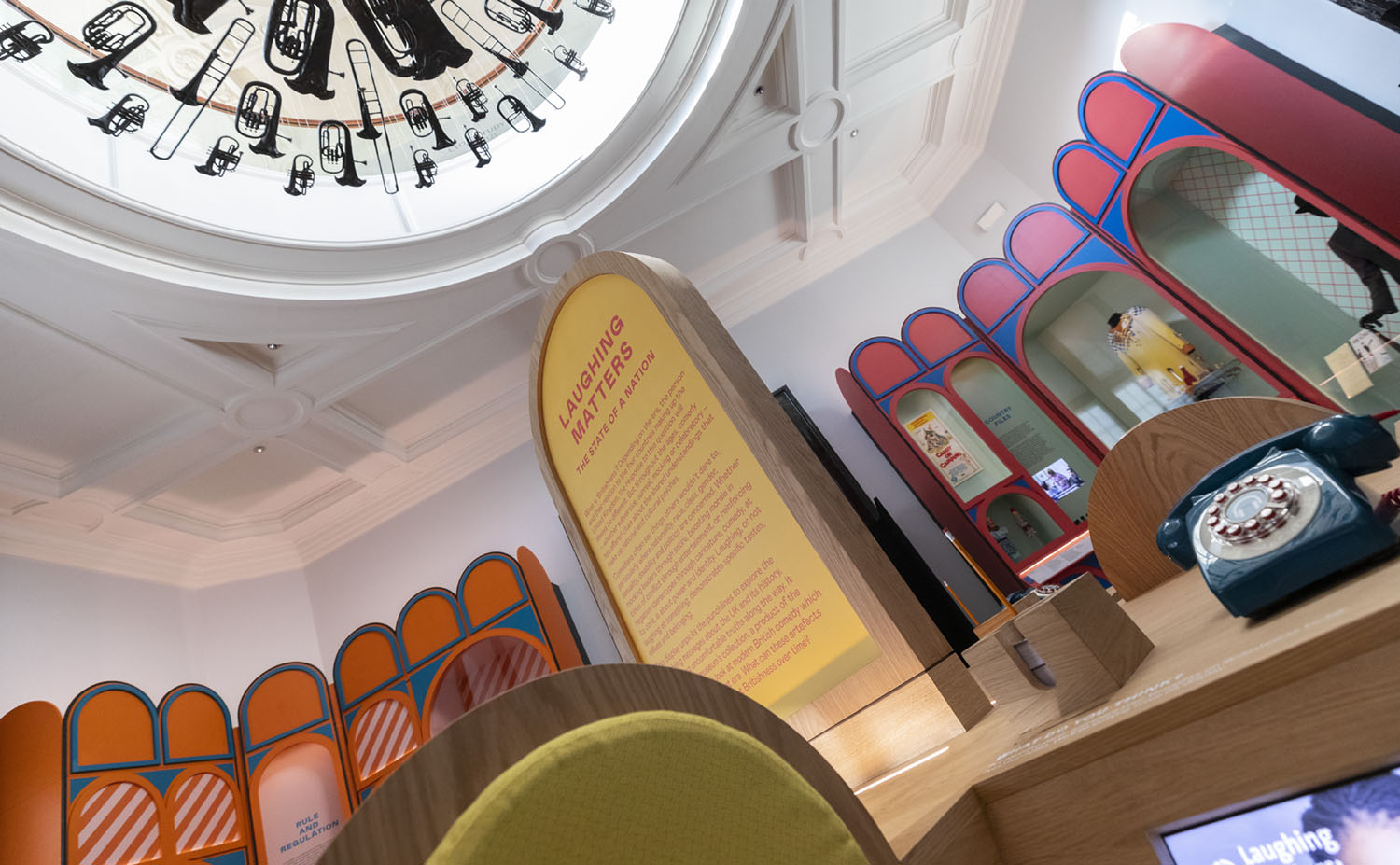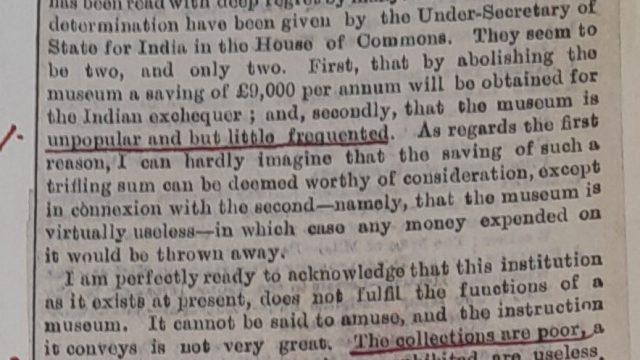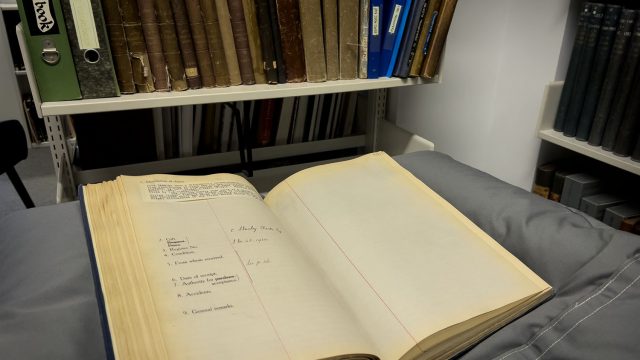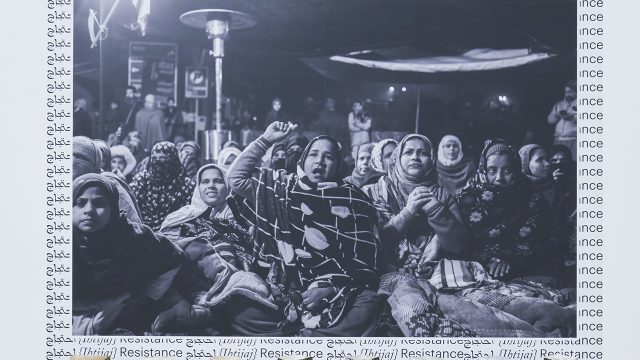What is ‘Britishness’? Depending on the era, the person and their relationship with the four countries that make up the United Kingdom, the response to this question will always be different. But throughout the ages, comedy – whether subversive, surreal, mocking or celebratory – has offered clues about the shared understandings that make up national and cultural psyches.

In 2019, V&A South Kensington opened Laughing Matters: The State of a Nation to explore Britishness through the lens of comedy. 2019 was a significant year for both the history of comedy and the United Kingdom; it marked the UK’s intention to leave the European Union, Monty Python’s 50th anniversary, Carry On Camping‘s 50th anniversary, and the 200th anniversary of the birth of Queen Victoria and Prince Albert, the museum’s namesakes.
From the saucy to the surreal, British comedy encompasses many tropes, traits and trends, but what does it reveal about the UK? Comedy is an incredibly powerful lens through which to examine a culture; it is both for and of the people. How we see others reveals much about how we see ourselves. Are we laughing at or with? Do we get the joke or not? Are we an insider or outsider? Charting its evolution allows us to unpick the punchlines to explore how comedy has shaped, reflected and enforced ideas about ‘Britishness’ over time.
Comedians often say things others wouldn’t dare to, particularly where nationality, race, class, gender, sexuality, disability and politics are concerned. Whether mocking leaders through satire, boosting morale in times of conflict through entertainment, or reinforcing negative stereotypes through caricature, comedy – at its core – is about power and identity.
Situated in the heart of the Britain Galleries, Laughing Matters: The State of a Nation attempts to deconstruct the UK in four chapters: ‘Country Files’ explores how the island’s status as a nation of nations affects its character, cuisine and culture; ‘Rule and Regulation’ looks at the way the UK is governed; ‘Allies and Enemies’ seeks to assess the impact of World War Two; and ‘Cruel Britannia’ investigates power in terms of Empire, race and multicultural Britain.
From Dame Edna’s Breakfast Dress, which celebrates the British greasy spoon, to pantomime Dame Nanny Nora’s Brexit Dress that marked the EU referendum, the gallery presents material from the V&A’s comedy collections, first established in 2010. In addition to over 30 objects encompassing scripts, sheet music, puppets, posters, cartoons and costume, you can also watch classic clips and listen to contemporary comedians reflecting on their own practice. You’re invited to contribute your thoughts on Britishness and the display via small notecards; a selection of which are displayed and rotated regularly.
Comedians love taking aim at those in charge, ‘punching up’ at people in power. Many works of satire, such as Spitting Image, take rulers down a peg or two by painting them as grotesque, bickering, child-like caricatures. They subvert the expectation that educated, respectful leaders act responsibly and can be trusted. Putting the audience in a position to laugh gives them a tantalising, if momentary, sense of superiority.
A tool for both cohesion and division, comedy also exposes and amplifies societies’ prejudices, fears and anxieties. Whether someone laughs at a joke depends on their status as an insider or outsider, a supporter or opposer. This has never been more apparent than during the British Empire, which at its peak ruled the lives of 450 million people worldwide. Throughout the 19th century, Britain asserted power over the territories it took hold of, exploiting their workforces, resources and customs. In turn, British comedians and entertainers helped enforce the ideology of power by creating demeaning representations of other cultures.
During the 20th century, new trade deals, conflicts and waves of migration shaped contemporary Britain, but racism did not end with the decline of the Empire. Multiculturalism’s challenge to an assumed white superiority led to further divisions, often enforced by comedians. Now, in the 21st century, many comics challenge historical stereotypes and celebrate diversity, but there’s still a long way to go before comedy is truly inclusive and confronts prejudice inherited from the Victorian period.
Performance’s ephemerality and comedy’s preference for the present cements its status as a quasi-living ‘newspaper of the year’, created for a particular audience with a particular set of reference points at a certain time. Comedy can help us capture the landscape of society, but in doing so presents many challenges, particularly if those landscapes offer uncomfortable truths for some. Intent and interpretations are increasingly impossible to define in an era of fake news and social media. What Queen Victoria herself would have thought of her megalomaniac namesake from Aardman’s The Pirates! In an Adventure with Scientists! appearing in the V&A alongside Spitting Image’s Margaret Thatcher and a German nutcracker of Queen Elizabeth II (pun intended), we can only surmise. Hopefully she would have been most amused…


